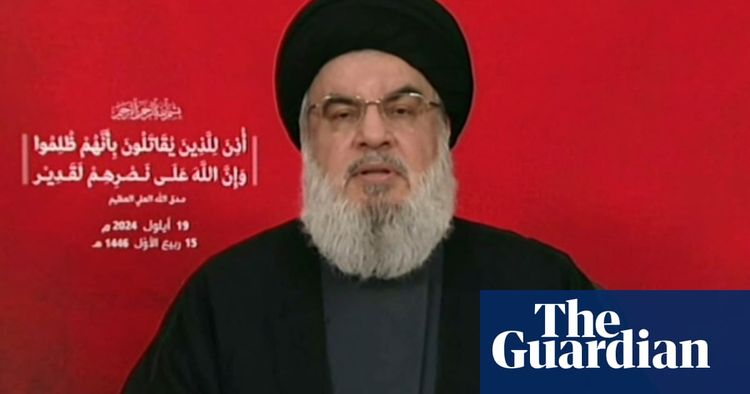Israel says it has killed Hezbollah leader Hassan Nasrallah

The Israeli military has announced that it has eliminated Hezbollah leader Sayyed Hassan Nasrallah following a series of attacks on a southern area of Beirut. The Israel Defense Forces (IDF) stated that their operations focused on Hezbollah's underground base in the Lebanese capital.
The news was revealed on Saturday morning following a night of speculation regarding Nasrallah's situation, who has been at the helm of Hezbollah for thirty years.
As reported by sources in Israel, the Israeli security cabinet initially decided against the idea of assassinating Nasrallah. However, after finding out that he was expected to be at a meeting in the command facility, they approved a plan for his elimination.
Israeli media reports indicated that the assassination was executed by a fleet of F15I fighter jets armed with bunker-busting bombs.
The announcement was first made by military spokesperson Lt Col Nadav Shoshani in a short message on X, declaring, "Hassan Nasrallah has died."
In a statement released shortly after, the IDF announced that Nasrallah had died along with Ali Karki, Hezbollah's commander for the southern front, as well as several other commanders present at the meeting.
According to a statement, based on accurate information from the IDF and Israeli security forces, Israeli Air Force fighter jets carried out a focused attack on the main headquarters of the Hezbollah terrorist group, situated underground beneath a residential building in the Dahieh neighborhood of Beirut.
"The attack took place during a time when top leaders of Hezbollah were based at their headquarters and actively engaged in planning terrorist actions against the people of Israel."
The Israeli military announced that it was in a state of heightened readiness and bracing for a potential increase in hostilities.
Hezbollah has not yet responded to Israel's allegation that it has killed Nasrallah.
In Lebanon, people were taken aback by the news of the assassination, finding it hard to accept Israel's assertions.
Following the news of the recent killing, a local from Dahieh expressed their feelings of hopelessness, stating, “I’m overwhelmed, I’m unsure about my emotions.” Meanwhile, some supporters of the group displayed a more resilient attitude. “The organization will continue; it doesn’t rely solely on one leader,” Fatimah, another Dahieh resident, shared from her car in downtown Beirut, where she has been staying with her husband and son since the attacks on their neighborhood began last week.
The deputy leader of the organization, Hashem Safieddine, who is seen as a potential successor to Nasrallah, was reportedly also targeted in Israel's airstrike on Beirut last Friday. It's currently unclear how the next leader of Hezbollah would manage the group and what approach they might take in response to Nasrallah's death.
On Saturday, Herzi Halevi, the chief of staff of the IDF, stated that taking out Nasrallah was just one part of their strategy, suggesting that additional attacks are forthcoming. He mentioned that the operation aimed at Hezbollah's leadership was the outcome of extensive planning over time.
The military announced that it is calling up more reserve soldiers in response to rising tensions with Lebanon. They are deploying three reserve battalions to various locations throughout Israel. Earlier in the week, they also dispatched two brigades to northern Israel for training in preparation for a potential ground offensive.
The murder could drag Iran into the conflict, despite its previous hesitance to engage in the fighting against Israel, given its support for Hezbollah. Iran's embassy in Beirut posted on X, stating that the attack on Dahieh represents a serious escalation that alters the dynamics of the situation. They also cautioned that those responsible would face appropriate consequences.
Just prior to the strike, Israeli Prime Minister Benjamin Netanyahu declared in a speech at the UN General Assembly that he would continue military action in Lebanon, dismissing any hopes that Israel would accept a 21-day ceasefire suggested by the US and France.
Netanyahu stated in New York that there is no location in Iran that Israel cannot access, and this applies to the whole Middle East as well.
Hezbollah's supporters have a deep reverence for Nasrallah, almost seeing him as a messianic figure who freed southern Lebanon from Israel's 18-year control. During Hezbollah events, crowds often chant “Labaik ya Hussein and Labaik ya Nasrallah,” which translates to “O Hussein, O Nasrallah, I am here for you.” This demonstrates their loyalty not only to Hussein, a significant figure in Shia Islam, but also to Nasrallah himself.
During his televised speeches, Nasrallah's followers would watch closely for his insights on political, spiritual, and cultural matters. A significant number of Lebanese people believe that a speech from Nasrallah played a crucial role in the downfall of the 2019 revolution. In that address, he advised his supporters to leave the streets, which stripped the protest movement of its inclusive, non-sectarian identity.
The person stepping in for the mysterious former secretary general will face an organization that, in the past year, has seen nearly all of its top military leaders depart and is currently struggling due to the Israeli airstrikes.
The death raises concerns about the future of the Lebanese state. Hezbollah has a significant presence within the government, holding a major portion of parliamentary seats and wielding power over various ministries, including the general security directorate. The group's influence heavily shapes Lebanon's foreign policy, especially regarding its relations with neighboring countries like Israel.
Hezbollah started launching attacks on Israel the day after Hamas carried out its assault on southern Israel on October 7, which ignited the conflict in Gaza.
Recently, Israel has redirected its military efforts from Gaza to Lebanon. This shift has led to intense bombing that has resulted in over 700 fatalities and forced approximately 118,000 individuals to flee their homes.







































